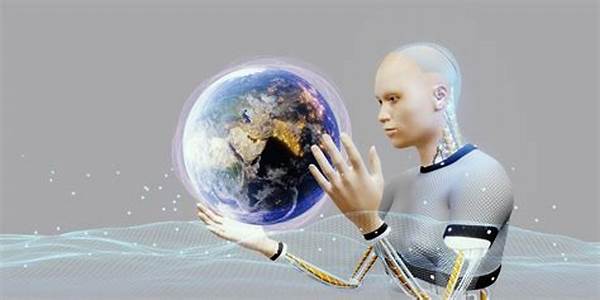In a world increasingly powered by technology, AI promises to redefine the way we think about the global economy. With its capability to analyze large datasets quickly and identify patterns not easily visible to the human eye, AI is not just a buzzword but a transformative force. As we step into the future, businesses, governments, and individuals alike are faced with the task of adopting this groundbreaking technology to stay relevant. Let’s put the spotlight on the future of AI-driven global economy and discover what it holds.
Read More : The Role Of Ai In Environmental Protection
Imagine walking into a store where your preferences are known the moment you enter. The beverage you usually buy is already being kept aside by an attendant who knows you well—not personally, but through data analysis. That’s AI working right there, pushing the boundaries of personalized customer experiences. Brands are striving more than ever to create unique selling propositions powered by AI, eliminating guesswork from marketing strategies.
As we delve deeper into the future of AI-driven global economy, it’s essential to address the concerns surrounding job displacement. While AI can and will automate many tasks, it also opens avenues for roles centered on creativity, strategy, and relationship-building. There’s a call for educational reforms that prepare future generations to work alongside AI rather than in competition with it. This is where we need unified action, from policymakers to educators, ensuring that the workforce transitions smoothly into the AI era.
Harnessing the Power of AI for Global Prosperity
The future of AI-driven global economy may sound like plot points from sci-fi novels. However, real-world applications show it as a proponent of global prosperity. The automation potential of AI in manufacturing not only boosts productivity but steadily enhances product quality. But that’s not all; economic models reveal that AI can contribute significantly to GDP growth with the potential of adding extra trillions to the global economy by 2030.
—
Unleashing AI’s Economic Potential
In recent studies, AI’s role in reshaping the global economy is not just theoretical but already in motion. As per top economists, countries that effectively integrate AI could see a boost in economic productivity by up to 40%. This is no small feat but a testament to the power AI holds over the global economic repair and growth.
The future of AI-driven global economy presents us with opportunities that were once thought impossible. With advancements in machine learning, businesses can predict consumer preferences, governmental artificial intelligence initiatives can help streamline numerous bureaucratic processes, and research industries can accelerate findings that save lives and improve global health.
The Ethical Implications of AI in Economy
It’s hard to ignore the ethical implications that come with such a powerful tool. When discussing the future of AI-driven global economy, public debate often stirs between the potential benefits and risks AI poses. There’s an ongoing dialogue about data privacy, transparency, and algorithmic fairness. The ethos of AI development must be grounded in fairness and equality to ensure its benefits are universally shared.
The narrative of AI in the economy is colored by both optimism and skepticism. History shows that we are adaptable; humanity has transitioned from the Industrial Revolution to the Digital Age remarkably. As we stand on the brink of an AI Revolution, stakeholders seek to maximize benefits while mitigating associated risks.
Preparing for an AI-Driven Future
Preparation becomes the clarion call for nations and businesses anticipating the eventualities of the future of AI-driven global economy. Training programs geared toward upskilling workers are crucial—preparing them for jobs enhanced rather than replaced by AI.
Inclusive dialogue and policymaking are just as vital. Cross-sector partnerships can guide the responsible implementation of AI, fostering innovation that aligns with societal values. As AI continues unveiling its potential, its role in shaping industries, from finance and healthcare to education and logistics, becomes more pronounced, demanding coordinated action from all corners of the globe.
—
The future of AI-driven global economy sets the stage for both unprecedented challenges and remarkable opportunities. Above all, it offers potential solutions—from optimizing supply chains to personalizing consumer experiences to making healthcare more efficient. For businesses and leaders, understanding these dynamics is the cornerstone of staying ahead in the race to harness AI’s full potential.
Harnessing AI’s capabilities is not just about keeping up with technological advancements; it is about leading the charge into a future brimming with possibilities. The primary objective is to create a symbiotic relationship between AI systems and human expertise, using the former’s speed and data-processing capabilities to complement the latter’s creativity and strategy. This synergy is key in preparing the workforce for a future where AI is an everyday collaborator.
Global leaders are tasked with fostering an environment where AI can thrive without displacing human labor. This involves prioritizing educational reform to prepare future generations with skills complementary to AI—for example, roles in counteracting AI’s biases, designing ethical algorithms, or managing human-AI interaction.
By leveraging AI, we aim to resolve contemporary challenges, especially in healthcare, where AI can predict outbreaks and tailor personalized treatments. Another important role of AI is to augment sustainability efforts, refining energy consumption to support environmental goals.
In the future of AI-driven global economy, businesses are encouraged to adopt technologies that enhance customer relationships and streamline operations. Through AI, companies can achieve higher productivity and better understand changing consumer demands, allowing ventures big and small to compete in a crowded market. The way forward includes a concerted push towards AI-driven solutions that promise economic growth and societal benefits alike.
How AI is Revolutionizing Global Markets
In essence, AI isn’t just a tool—it’s a new kind of partner in our journey forward. Its growing influence in global markets is undeniable, offering businesses invaluable insights gleaned from data analysis. For entrepreneurs and industry leaders, leveraging AI’s potential translates into competitive edge, increased efficiency, and unprecedented opportunities for innovation.
Understanding the future of AI-driven global economy doesn’t merely involve watching from the sidelines, but actively engaging, learning, and adapting to its rapid evolution. Whether you’re a small business owner, a policy maker, or an industry mogul, AI is a pivotal part of your economic journey. What are we waiting for? The future is now, and it’s powered by AI.


